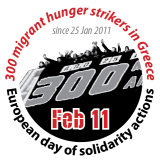The rally was rather small and thus proved many people’s expectations right. However, when Amadou M’Bow grabbed the microphone, the protest in front of Frontex’ headquarters in Warsaw in 2008 gained momentum (photo: Amadou M’Bow). A representative of the Mauretanian Human Rights Organization AMDH (Association Mauretanienne de Droits de l’Homme), M’Bow demanded an immediate stop of the agency’s ongoing actions within “Operation Hera.” In a later conversation, he directly engaged persons in charge at Frontex, emphasizing the deadly consequences of the agency’s operation along the West-African coastline.
Activists from Poland, Italy, Greece and the Netherlands participated in this first round of protests at the headquarters of the European External Borders Agency on June 6, 2008. Mobilization to this protest was part of a transnational chain of actions against the European border and deportation regime, taking place consecutively at 10 different sites. In addition to a critique of border enforcement and deportation policies, the actions brought public attention to migrant labor issues.
In the call for action, the two objectives had been discussed within a larger framework: “[A]ll over the world, capitalist exploitation is unimaginable without global differences, constructed through filters and zones, hierarchies and inequality, and through external as well as internal borders. The illegalization and deportation of migrants on one hand, selective inclusion and recruitment of migrant workforce on the other hand are two sides of the same coin: migration management for a global apartheid regime, whose most precarious conditions of exploitation are based on the production of hierarchies of rights and on racist discrimination.”
Transnational Chain of Actions
It was no accident that Frontex had been chosen as the main target of several protests within the chain of actions. As early as March 2008, the self-help organization AME (Association Malienne des Expulsés) had organized a conference of 200 people affected by deportation and repulsion. During this conference, the externalization of EU migration control, i.e. the institutionalization of European border and migration policies in sub-Saharan countries, as well as Frontex’ role in this process were the focus of much criticism.
Protests at another site of the chain of actions, the anti-Racist action camp organized in Hamburg in August 2008, targeted Frontex in two separate campaigns. First, a “flooding” of Hamburg’s airport addressed the “Charters of Shame”, charter flights used to deport immigrants from Europe that are coordinated and funded by Frontex. (3) In a second protest, activists gathered in front of the Federal Police Academy in Lübeck, where training courses for Frontex are held regularly. (photo: activists of “Lebenslaute” at the academy).
The 5th Social Forum in Malmö (Sweden) in October 2008 provided a first opportunity to reflect on the chain of actions and to plan further protests against Frontex and their coordination on the European level. At the final meeting of activists engaged in the support of immigrants and refugees, a noborder camp on the Greek island of Lesvos was proposed for the first time. To remind the reader, in the summer of 2008 Frontex deployed a ship to the coastal waters of Lesvos and attempted to block immigrants from going ashore. Organizing an action camp close to this hot spot of the European border regime would offer an opportunity to directly interrupt Frontex’ operations, the proposal argued. Currently, in August 2009, mobilization to the camp in Lesvos is in full swing and organizers expect between 400 and 500 participants from all over Europe. One of the action days is explicitly designated to address the practices of the Greek coastguard and of Frontex.
Transnational Manifesto
“The European border regime is a crucial instrument for the production of […] differences and hierarchies. The militarization of the borders, the patrol of the Mediterranean area and of the eastern Europe, the readmission agreements, the homogeneous system of control which Europe is trying to develop through Frontex, all this facts must be read as instruments of selective inclusion and recruitment of migrant men and women, whose movements everyday threaten the borders themselves. Yet, this is not impeding migrants’ struggles. Rather, what is at stake today is the transnational connection of these struggles.” These lines originate from a manifesto released by groups who had participated in the meeting in Malmö. The upcoming noborder camp in Lesvos is supposed to be a space where activists can discuss and develop the goals and strategies outlined in the manifesto. The camp will enable a gathering of activists from many member states of the Schengen Agreements. In addition, members of an initiative monitoring the border in the Ukraine, members of European-African networks based in Morocco, Mauritania and Mali (see above), as well as groups from Turkey who had organized a noborder camp in Dikili, on the other side of the Agaean Sea, in 2008, are invited.
The transnational gathering will open up an excellent space to extend and strengthen the campaign against Frontex. Activists need to tackle the question, how, on a local level, it is possible to denounce and question the Border Agency’s practices as those of hunters and murderers of boat people. Potential sites of protests to consider are, for instance, the various forms of publicity employed by the agency, as well its trainings and operations ashore, at sea and at airports that we can observe more and more frequently. In this regard, the noborder camp on Lesvos will be the site of first and important practical experiences.
Toward the end of the year, there will be new opportunities to articulate collective protest. Since July 1, 2009, Sweden is holding the EU-presidency. For November or December, the passage of the so-called “Stockholm Program” is scheduled. A successor of the programs adopted in Tampere (1999) and Hague (2004), the Stockholm Program outlines a new Five-Year-Plan on Justice and Home Affairs. It comes as no surprise that an increased appreciation of and further technical upgrades for Frontex’ actions are essential parts of the new plans. In that sense, Stockholm might as well be a useful stage for well-coordinated and concerted campaigns.
This report was first published in German in the 2009 Frontex Brochure.



